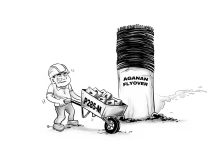
TEACHERS know this instinct. Shame in classrooms is used sparingly, as a reminder, not a weapon. When a child copies homework, the goal is not to brand him a cheater forever but to guide him back to honesty.
Society can do the same. “Kurakot shaming” is not public stoning. It is civic mentoring. It tells leaders: the trust you hold is not applause on cue, but accountability when broken.
What frightens me most is the quiet. In one forum, Mayor Benjie Magalong put “leakage” at about 40 percent. Sen. Ping Lacson has claimed it reaches 60 percent.
Over coffee with my fraternity brothers in the Department of Public Works and Highways (DPWH), I often hear the same tired shrug: “Ganyan na ‘yan.”
The normalizing is the rot. The figures are shocking, but the bigger tragedy is how they are treated as normal. “SOP” and “for the boys” have become jokes.
Jokes kill shame. When shame fades, impunity takes its place. That is why President Ferdinand Marcos Jr.’s line in his State of the Nation Address — “Mahiya naman kayo sa inyong kapwa Pilipino” — cut deep, whether or not he truly meant it. It was more than a budget issue. It was a question of conscience.
Some say shame is not enough, that laws should do the job. But the truth is both are needed. Courts punish, shame deters. Cases in the Sandiganbayan drag on for years, but public outrage spreads overnight. Even when Statements of Assets Liabilities and Networth are restricted, citizen talk can pry them open. Until institutions speed up, public shaming is civic pressure. Not revenge, but first aid.
As a father, teacher, and counselor, I know shame works best when paired with reflection. The real lesson is not “you failed,” but “remember who you are responsible to.” Politics is no different. The true power of “kurakot shaming” is not the hashtag but the hope that someone in office still blushes when reminded of conscience. That blush can spark reform.
Two trillion pesos have been poured into flood control, yet communities still drown. The real flood is not water but mistrust. To stem it, we need audits, faster courts, and honest contractors.
But alongside those, we need the discipline of shame. Not the toxic kind that bullies, but the civic kind that teaches. Calling out corruption is not mere venting. It is cleansing. And in a country drowning in both water and excuses, that is hygiene we cannot skip.
***
Doc H fondly describes himself as a “student of and for life” who, like many others, aspires to a life-giving and why-driven world grounded in social justice and the pursuit of happiness. His views do not necessarily reflect those of the institutions he is employed or connected with./PN







